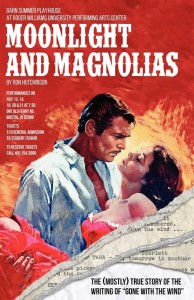 Often considered among the greatest films of all time, Gone with the Wind got off to a wildly inauspicious start. A few weeks into filming, producer David Selznick suddenly halted production. He fired the director and brought in Victor Fleming straight from the set of a little film called The Wizard of Oz. He then brought in Ben Hecht to rewrite the screenplay. The problem? Hecht had never read the book. For one week, the three locked themselves in Selznick’s office, where they lived off of only bananas and salted peanuts, and Fleming and Selznick reenacted the entire 1,037-page book for Hecht to capture in a script, objecting every step of the way to the story’s questionable morality.
Often considered among the greatest films of all time, Gone with the Wind got off to a wildly inauspicious start. A few weeks into filming, producer David Selznick suddenly halted production. He fired the director and brought in Victor Fleming straight from the set of a little film called The Wizard of Oz. He then brought in Ben Hecht to rewrite the screenplay. The problem? Hecht had never read the book. For one week, the three locked themselves in Selznick’s office, where they lived off of only bananas and salted peanuts, and Fleming and Selznick reenacted the entire 1,037-page book for Hecht to capture in a script, objecting every step of the way to the story’s questionable morality.
Such is the (mostly) true story being staged at the Barn Summer Playhouse at Roger Williams University. Moonlight and Magnolias, a phrase coined for the movie referring to the romanticization of the pre-Civil War South, dramatizes the men’s five-day descent into madness while also examining the bigger picture of Hollywood in 1939. It is a definite passion project for director Jeffrey Martin, who wrote his PhD dissertation and his subsequent book on Ben Hecht’s career.
The play has a small cast, with only four performers, one of whom, Selznick’s secretary, is only seen sporadically. First is Selznick (Brien Lang), the producer with a lot to prove. A lot is at stake for Selznick with this production. He needs this film to be a hit in order to avoid the fate of his father before him: Lewis Selznick, whose production company went bankrupt in the previous decade. To add insult to injury, his father-in-law is his boss. Screenwriter Ben Hecht (Jim Sullivan) answers to a higher call. He would much rather be writing something affecting and relevant to the times they are living in, what with the world on the brink of a second world war. He wants to “make America look at its ugly face in the mirror,” and a story that makes heroes of slave owners and the Klan makes that impossible. His objections are perhaps the biggest stumbling block in the process, as he attempts to make the work more palatable and appeal to Selznick’s own experiences with oppression as a fellow Jew. Victor Fleming (Nick Corey) is uninterested in Hecht’s moral ramblings; he just wants to make a movie. Though he’s not a fan of the original novel either, if this project gets him out of munchkin-wrangling, he’s all for it.
The cast is rounded out by Miranda Coker as Miss Poppenghul, the secretary. Though her appearances are few and brief, she shows us all just how many different ways there are of saying the same three words (“Yes, Mr. Selznick”).
Tensions are high from the start, with Hecht and Fleming immediately at each other’s throats, each using the other’s past profession (as journalist and car mechanic, respectively) as taunts, where perhaps this should be where they find common ground. While Corey’s presence as the tough guy in these moments falls short, it’s in his comedic moments where he’s at his best, from portraying Melanie in labor, to scrounging for the last remaining banana only to be unable to peel it in his sleep-and food-deprived state. Likewise, Sullivan’s Hecht is impassioned in his moralizing, but also funny as he drags his feet through the process, wincing all the way through writing that terribly trite final line, “Tomorrow is another day.” All the while, Lang’s Selznick attempts to keep them on track and with their eyes on the prize.
Like the characters, the set, designed by Matthew Paquin, becomes increasingly more chaotic, going from a tidy office to what looks like a warzone, with banana peels, crumpled up paper and peanut shells all over the floor and furniture knocked over. Those with peanut allergies should skip this show, as peanuts are consumed and thrown around. Emily Taradash’s costumes undergo a similar transformation, becoming more and more disheveled with each scene.
Fans of Gone with the Wind will enjoy this peek into the process by which some of the most famous scenes and lines made it from book to movie, but even those who haven’t seen the film will find it to be a funny and thought-provoking look at Hollywood and the creative process.
Moonlight and Magnolias runs through July 21 at the Barn Summer Playhouse at Roger Williams University. For tickets, call the box office at 401-254-3666. The show will then move to The Wilbury Theatre Group’s space Aug 17 through 26.
